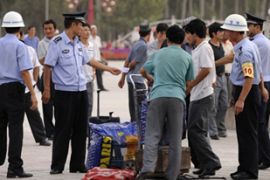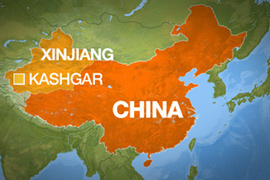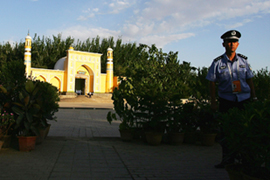Xinjiang tense in wake of attacks
Unease and tight security in China’s Muslim far west follows deadly attacks.

Foreigners had their passports photocopied and their details entered into a computer.
 |
A total of 31 people have been killed in just 2 weeks in the deadliest upsurge in violence seen in Xinjiang for many years.
Uighur exile groups based in Germany say the government has detained dozens of innocent Muslims in the wake of the attacks.
On August 4, Kashgar, close to the frontier with Afghanistan, saw the deadliest of the recent attacks when two men drove a truck directly into a group of jogging border police outside a small boarding house.
They threw what the authorities described as grenades, and continued the attack with knives.
By the time the attackers were overpowered, 16 policemen lay dead.
Reports in Chinese state media said police later found papers detailing a plan for “holy war” in the attackers’ belongings.
It was a severe and bloody assault but with apparently very few witnesses – the owner of a nearby boarding house said she saw nothing.
When I asked a local shopkeeper how 16 people had died without his seeing any thing, he told me to go and ask the government.
The government itself has said little, despite claiming several months ago that there was a very real possibility of an attack from Muslim Xinjiang-based fighters targeting the Olympics.
But the simplicity of the weapons used – trucks, homemade bombs and knives – does not suggest the operations of a global “terrorist” network.
And the nature of the attacks appears more spontaneous than highly planned.
Kashgar’s famous bazaar is still bustling with life, but in the wake of the recent violence everyone there seems a little more wary.
Resentments
The ethnic Uighurs have long had resentments about government by Beijing over cultural repression and what they says is exclusion from jobs and educational opportunities.
But few people we spoke to seem to have an appetite for the violent attacks of the past few weeks.
 |
| Kashgar was an important Silk Road gateway [GALLO/GETTY] |
“Before we never had problems like this, just a few bad people causing trouble,” said one woman. “Now we’re really in danger.”
“I’m feeling really frightened now, it’s not safe at all,” said another market trader. “It feels like anyone could be attacked.”
The government has released a statement saying they believe these attacks were co-ordinated by what they call separatist forces, aiming to create a Muslim state known as East Turkestan.
On Thursday, the head of the communist party in Xinjiang, Wang Lequan, was quoted as saying the country faces a “life and death” struggle against terrorist forces.
Quoted in state media, Wang said the recent attacks were “planned, organised and premeditated terrorist violence”.
“After the incident, relevant authorities handled it according to law, preserved social stability and the normal order of work and life.”
What the means for the residents of Kashgar, which for 2,000 years has stood as a gateway into and out of China, is that their city remains surrounded by checkpoints and is increasingly isolated and cut-off.